Kaye Lynne Booth's Blog: Writing to be Read, page 110
February 25, 2021
Mind Fields: My Eating Disorders
 Mind Fields
Mind FieldsThe first time I grasped that I was deeply crazy was when I began to eat huge amounts of food. I indulged especially in sweets. If I were to make a pie chart of my life (and refrain from eating it), I’m sure it would show huge chunks of time in the bulimia/anorexia’ zone. The worst of my food disorders followed me through adolescence; years seventeen through twenty two. I was a “student” out in the world, trying to maneuver by being on college campuses.
I had a sneaky way of being anorexic. I deluded myself into thinking that this was a spiritual discipline. Macrobiotics. It would get me high, exalt me spiritually. By eating small portions of brown rice and onions, chickpeas in barley, I was the paragon of yogic discipline. This was who I wanted myself to be. I got skinny. I weighed 125. On top of this I was taking LSD, DMT and smoking weed. I was deep into my purpose, my destiny of becoming a musician of salvation and a figure of reverence. I hope you can hear the self mockery in my tone.
Then I came to a breaking point. After a year of eating a strict Macrobiotic diet I had such a craving for a peanut butter and jelly sandwich that I bought the ingredients and took them back to my hidey hole. “What are you doing?” I asked myself. “This is a self betrayal, this is the opposite of Macrobiotic discipline. You asshole, what a failure you are!” So I ate it. Then I ate something else sweet and gooey. Then I couldn’t stop eating every kind of junk food on the planet. I had been like a coiled spring ready to bounce. Boing!
I was so ashamed of myself. This was 1967, before eating disorders had been invented. I was a pioneer. My bulimia wasn’t the pukey kind. It was the Exercise Freakishly type of bulimia, the one where on alternate days I would purge with sweat and effort, then follow with a day of relentless eating: an entire apple pie, backed up by a half gallon of ice cream. After that came the cookies, and so forth. One day exercising. One day binge eating. Back and forth, one followed the other, for more than a year. It was insane and I knew it. I got so unhealthy that I could pull out hands full of my own hair! I looked for help. I went to the college shrink. I was desperate. He said, “I don’t know what’s happening to you and I can’t help you.”
Ironically, I lost weight. My waist was a twenty nine or thirty. I was not a registered student any more, I had dropped out. I was living in a vacant student’s quarter, avoiding the security guys and bedding down with a pad and sleeping bag. I got money from my dad. I worked as a stable boy at a local horse ranch. I had my drums stashed at the university’s music building in a practice room. I practiced there for hours every day, getting high by all means and experimenting with the limits of my technique. That was the point of not attending classes. I let my dad pay for semesters at Western Reserve and then I would slip down to Antioch College in Yellow Springs from Cleveland and hang out with people who talked to trees. I practiced with relentless vigor, working through the famous “Stick Control” book and listening to Coltrane records.
Wait a minute. I’m conflating two different periods of time. It doesn’t matter. That’s the way memory works. It’s all narrative but sometimes the pages are out of order. I find myself more objective about my life as I get older. My life has been so bizarre that it qualifies as the stuff of novels. That poor guy (that is, myself) didn’t know what lay ahead. He thought that if he took enough acid, did yoga and meditation, ate rice and played the drums then he would launch himself into nirvana. It’s not a bad plan, really. The problem was that I was fractured psychologically, harboring behaviors that would shame me again and again. They would almost kill me.
These were adolescent ordeals, but they were precursors to my future. In 1967 my eighteen year old self dreamed of cosmic unity while the biggest thing that lay ahead of me was heroin addiction. I interrogated my psyche by reading Jung and Freud. After that came years of therapy. I was determined to save myself.
It took a long time, but none of it can be repudiated. I am lucky to be alive and well.
I’m still slightly food disordered. I control, compensate, manage. Mostly I exercise and pray.
______________________________________________________________________________________
 Feral Tenderness
Feral TendernessArthur Rosch is a novelist, musician, photographer and poet. His works are funny, memorable and often compelling. One reviewer said “He’s wicked and feisty, but when he gets you by the guts, he never lets go.” Listeners to his music have compared him to Frank Zappa, Tom Waits, Randy Newman or Mose Allison. These comparisons are flattering but deceptive. Rosch is a stylist, a complete original. His material ranges from sly wit to gripping political commentary.
Arthur was born in the heart of Illinois and grew up in the western suburbs of St. Louis. In his teens he discovered his creative potential while hoping to please a girl. Though she left the scene, Arthur’s creativity stayed behind. In his early twenties he moved to San Francisco and took part in the thriving arts scene. His first literary sale was to Playboy Magazine. The piece went on to receive Playboy’s “Best Story of the Year” award. Arthur also has writing credits in Exquisite Corpse, Shutterbug, eDigital, and Cat Fancy Magazine. He has written five novels, a memoir and a large collection of poetry. His autobiographical novel, “Confessions Of An Honest Man” won the Honorable Mention award from Writer’s Digest in 2016.
More of his work can be found at www.artrosh.com
Photos at https://500px.com/p/artsdigiphoto?view=photos
_________________________________________________________________________________________________
Want to be sure not to miss any of Art’s “Mind Fields” segments? Subscribe to Writing to be Read for e-mail notifications whenever new content is posted or follow WtbR on WordPress. If you find it interesting or just entertaining, please share.
February 24, 2021
#Blogtour – The Click of a Pebble by Barbara Spencer Day 3
For Day #3 of “The Click of a Pebble” Book Blog Tour finds us at “Robbie’s Inspiration” , with an intriguing guest post from author Barbara Spencer about magical realism and how “The Click of a Pebble” came into being. Join us there and learn more about this wonderful fantasy novel.
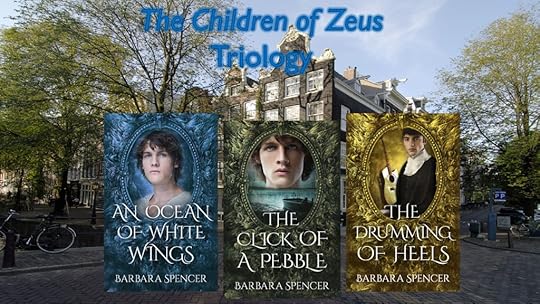
Today I am delighted to welcome talented author, Barbara Spencer, to Robbie’s Inspiration for Day 3 of her The Click of a Pebble book tour hosted by WordCrafter Blog Tours.
You can find Day 1 here: https://writingtoberead.com/2021/02/22/welcome-to-wordcrafters-the-click-of-a-pebble-book-blog-tour/
You can find Day 2 here: https://pattysworlds.com/2021/02/23/wordcrafters-the-click-of-a-pebble-book-blog-tour-writing-to-be-read-day-two/
The Series: Children of Zeus‘Where Historical Fiction and Fantasy Collide’
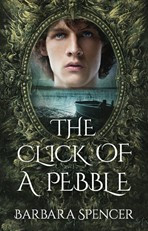
After a decade or more writing for children and young adults, I pretty much know my way around a children’s book. A couple of years ago, deciding I need a new challenge, I turned my attention to writing magical realism for adults.
But what is magical realism and how does it differ from fantasy? I think of fantasy as being set in a mythological world in which there are rules but maybe not the rules we subscribe to in our humdrum human world…
View original post 791 more words
February 23, 2021
Dark Origins – Hansel and Gretel

Most people are familiar with the story of Hansel and Gretel, a German fairy tale collected by the Brothers Grimm and published in their Grimm’s Fairy Tales in 1812.
In summary, the story goes as follows:
Hansel and Gretel are a brother and sister whose starving parents decide to abandon them in the forest. Hansel overhears his parents plotting and drops pebbles on the path so that he and Gretel can find their way home later. The family’s plight does not improve and a short while later the mother [or stepmother depending on the version] persuades the father to take the children into the forest again and leave them there. This time, Hansel drops a trail of breadcrumbs but the birds eat them and the two children become lost in the forest.
The starving children come across a gingerbread house and they begin to break off bits and eat it. The house, however, is a trap set by a wicked witch who captures the children, enslaves Gretel and locks Hansel in a cage. She sets about fattening Hansel up so that she can eat him.
Gretel saves Hansel by shoving the witch into the oven which she has heated up in order to cook Hansel. The pair escape and manage to find their way home with the witch’s treasure. In the meantime, their mother [or stepmother] has died and their father is a broken man having abandoned his beloved children. The family live happily ever after.
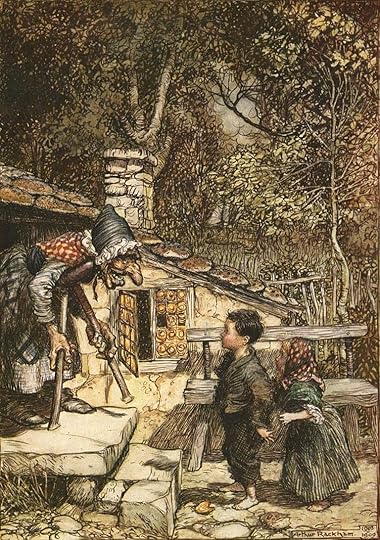 Picture from Wikipedia: https://en.wikipedia.org/wiki/Hansel_and_Gretel
Picture from Wikipedia: https://en.wikipedia.org/wiki/Hansel_and_GretelThe real history behind this already rather grim story, is even more grim.
The true story of Hansel and Gretel may have its roots in the great flood and great famine of 1314. 1314 Was a year of continuous rain and this continued throughout 1315 and 1316. The wet conditions resulted in crops rotting in the ground, harvests failing and livestock drowning or starving. Food prices increased dramatically as a result of severe food shortages.
The great famine is estimated to have effected 400,000 square miles of Europe, 30 million people and to have resulted in the deaths of up to 25 percent of the population in certain areas.
The famine was so bad that during the winter of 1315/1316, the peasants resorted to eating the seed grain they had stored for planting in the spring. People resorted to begging, stealing and even murder in their quest for food. Parents abandoned their children to fend for themselves and their were rumours of cannibalism. An Irish chronicler wrote that people “were so destroyed by hunger that they extracted bodies of the dead from cemeteries and dug out the flesh from the skulls and ate it, and women ate their children out of hunger.”
In the story of Hansel and Gretel, the pair are taken into the forest by their father and abandoned. They are taken in by an old woman living in a cottage. When the old woman starts to heat the oven, the children realise she is planning to roast and eat them. Gretel tricks the woman into opening the oven and pushes her inside.
It is interesting to note that this time of famine coincided with the end of the medieval warm weather period and the beginning of the little ice age. The changing climate with its cooler and wetter summers and earlier autumn storms damaged the harvests. Given the strange wet and cool summer South African is experiencing, coupled with severe cold in the northern hemisphere, this really is food for thought.
Another grim early tale along the lines of Hansel and Gretel is a Romanian story called The Little Boy and the Wicked Stepmother. You can read this story here: http://www.planetofbirds.com/the-story-of-the-little-boy-and-the-wicked-step-mother
The story of Hansel and Gretel was the inspiration for my recent twisted fairy tale Covid-19 cake which featured a gingerbread house and a witch who is trying to keep children out after they are declared to be vectors for the virus.
 About Roberta Eaton Cheadle
About Roberta Eaton Cheadle
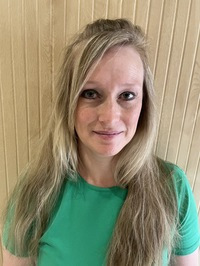


Roberta Eaton Cheadle has published nine children’s books under the name of Robbie Cheadle. She has branched into writing for adults and young adults and, in order to clearly separate her children’s books from her adult books, is writing for older readers under the name Roberta Eaton Cheadle.
Her supernatural stories combine fabulous paranormal elements with fascinating historical facts.
Supernatural fantasy YA novel:
Through the Nethergate
Horror Anthologies (edited by Dan Alatorre):
Spellbound
Nightmareland
Dark Visions
Paranormal Anthologies (edited by Kaye Lynne Booth):
Spirits of the West
Whispers of the Past
Murder mystery Anthology (edited by Stephen Bentley)
Death Among Us
Blog: https://wordpress.com/view/robertawrites235681907.wordpress.com
Twitter: https://twitter.com/RobertaEaton17
Facebook: https://www.facebook.com/robertawrites
Amazon: https://www.amazon.com/Roberta-Eaton-Cheadle/e/B08RSNJQZ5
_____________________________________________________________________________________________
Want to be sure not to miss any of Robbie’s “Dark Origins” segments? Subscribe to Writing to be Read for e-mail notifications whenever new content is posted or follow WtbR on WordPress. If you found it interesting or entertaining, please share.
WordCrafter’s “The Click of a Pebble” Book Blog Tour | Writing to be Read Day Two
Day #2 of “The Click of a Pebble” Book Blog Tour brings us Patty Fletcher’s review on “Patty’s World”. I hope you’ll join us there to learn more about this wonderful novel.
 Welcome to WordCrafter’s “The Click of a Pebble” Book Blog Tour | Writing to be Read Day Two
Welcome to WordCrafter’s “The Click of a Pebble” Book Blog Tour | Writing to be Read Day Two
Today, in our #ReadingWithTheAuthor series, where I’m hosting day two of The Click of the Pebble Tour, I’ve got a true treat for you.
If you missed day one you may catch up here: https://writingtoberead.com/2021/02/22/welcome-to-wordcrafters-the-click-of-a-pebble-book-blog-tour/
Many of you know author Barbara Spencer but do you know about her incredible books?
THE CLICK OF THE PEBBLE, TODAY’S FEATURED BOOK!The Click of a Pebble
Book 1 – The Children of Zeus
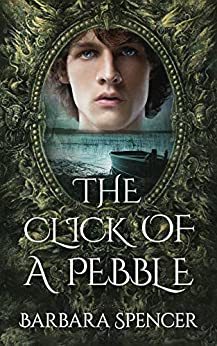 Only if Yöst keeps the supernatural powers of his family hidden will they remain safe from the witch hunt that has already killed his entire village, apart from two young children, Zande and Tatania.
Only if Yöst keeps the supernatural powers of his family hidden will they remain safe from the witch hunt that has already killed his entire village, apart from two young children, Zande and Tatania.
Offered shelter by a family of gypsies, Yöst strikes up a close relationship with the son of the house, Rico. As their relationship deepens, Yöst begins to think…
View original post 285 more words
February 22, 2021
Welcome to WordCrafter’s “The Click of a Pebble” Book Blog Tour
 The Click of a Pebble Book Blog Tour
The Click of a Pebble Book Blog TourWhen I picked up The Click of a Pebble to review for this tour, I wasn’t sure what to expect. The cover was ellegant, yet a bit mysterious, which had a certain appeal for me, and the title doesn’t give anything away, although it does add to the sense of mystery. I wanted to know more about this story. Only after I’d begun to read, did I understand why the author, Barbara Spencer, had chosen that particular title, and why it was the perfect introduction to this touching coming of age story.
Known as swan-people for their ability to shape-shift not only into the swanlike form of the carinatae, but also the celeste, the winged shape of Zeus himself. The children of Zeus although peace-loving, have always been forced to live apart from humans, persecuted almost to extinction.
Three children survive the latest massacre: Yöst, Zande, the son of the Black and destined to be the clan’s next leader, and a small girl, Tatania, who insists on being called TaTa.
This is their story.
The Children of Zues trilogy, of which The Click of a Pebble is book 1, is a delightful Y.A. fantasy, which I was soon emmersed in. It’s about the carinatae, or Swan People, decendents of Zues, who live among and pass themselves off as humans. When I started reading, I didn’t know what carinatae meant, or where this wonderful myth came from, but it didn’t take long for my curiosity to peak, and I wanted to know more.
 The Children of Zues trilogy
The Children of Zues trilogySo, I began to explore the internet to see what I could learn. Wikipedia defines carinatae as, “Carinatae is the group of all birds and their extinct relatives to possess a keel, or “carina”, on the underside of the breastbone used to anchor large flight muscles.” (https://en.wikipedia.org/wiki/Carinatae). This makes sense, since swans are then carinatae. But, I still wasn’t familiar with this particular myth, so I set about brushing up on my Greek mythology. The only mytholgy I found that dealt with swans in any way, was the story of Zues and Leda, which seemed to fit in with Spencer’s story.
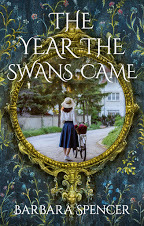 The Year the Swans Came
The Year the Swans CameWhen visiting the author’s blog site, Two Sides to Every Story, I learned that this myth was indeed at the heart of The Children of Zues trilogy, which is a prequel to The Year the Swans Came. This information excited me, because what it means is that Barbara Spencer has created a new set of mythologies from the old myths that we are all familiar with. Wow! Isn’t it fabulous that as authors, we can actually do things like that? And Spencer has done an excellent job of pulling threads from the original myth and weaving them into a mythology all her own. Now that is what being an author is all about!
It is my pleasure to present the The Click of a Pebble Book Blog Tour this week. Our wonderful blog hosts have lined up a greast tour for us, with reviews on Patty’s World and Writing to be Read, and an author spotlight on This is My Truth Now, and hear from the author,, on Roberta Write’s, and finishing off the tour on Barbara Spencer’s blog site, Pictures from the Kitchen. I hope you will join us and follow the tour to learn more about Barbara Spencer and The Click of a Pebble.
 The Click of a Pebble
The Click of a Pebble___________________________________________________________________________________________
Book your WordCrafter Book Blog Tour today!
February 19, 2021
Treasuring Poetry – Meet Arthur Rosch, a brave poet

To day, I am very excited to be hosting author and poet, Arthur Rosch, with his thoughts about poetry. I consider Art to be a brave poet as he poetry is so brutally honest and cuts to the core of difficult and emotional matters.
Over to Art:
My favorite poem is “Prophet”, written in 2001. Here it is:
Oh lord, oh lord,
what has befallen me?
That which I hoped to make straight
only becomes more twisted.
That which should be understood
only becomes more strange.
How did I come to this unexpected shore?
What am I to make of the walking wreck of myself?
I can still think, still work,
still speak in poems
in the sleepless time of the night.
It is a mixed gift, this life, it is hard
to feel so completely lost
in complexity I don’t know how I made.
I wanted to be a radiance
but I am more like a garbage can
tipped by a raccoon in predawn hours.
I pick myself up,
I sweep my contents
into a tidy pile,
but each time I think to rest,
I am again overturned.
I speak to you, o lord,
like the wounded Jew,
like the baffled bloodied prophet,
like the broken fated sage.
I take help from any quarter,
even those with dangerous denizens.
I take comfort with the scorpion,
I sleep with diseases,
I marvel and lament
at my scattered state,
at my continued surprise that I am alive,
that I move my limbs with some dim purpose,
that I have any faculty left to cry out to you.
Oh lord, what has befallen me?
You see, I have nothing but questions.
It could be much worse, I freely admit.
It could be much better,
I ruefully entreat.
Pieces of me have gone numb.
Whole continents of my psyche have been submerged,
drowned, forgotten.
I am the world I have made.
I am a man, dreadfully incomplete,
unwilling to meet the terror,
reluctant to behold the fire,
shrinking always from the worst case,
taking the hand of any wiser being,
like a lost child who needs to be led home.
I shall try now, lord, to snatch a bit of sleep
from the bottom of the night’s cup.
I’m glad we had this little talk.
I thank you, uncomfortably,
like one who has opened the wrong gift
at the wrong party.
Oh, is this for ME?
I’m not quite sure it fits,
I’m not sure how to use it.
I’ve broken it a little
but it still works. See?
I’ve tried, I’ve hopped on one foot,
I’ve danced insanely.
I’m still here,
waiting for your soft voice
to bring me peace.
You can listen to Art reading this poem here:
This poem is first of all my honest expression of vulnerability. It speaks of the paradox of the human condition in a way that echoes biblical expressions. Hence the name, “Prophet”. I am admitting to my grave faults, the problems that I have encountered that have led to my loss of innocence. Once I wanted to be a shining light and now I can barely raise my eyes to the sky. I have always been a man of spiritual aspirations but I am crushed by disappointment in myself. What has become of me? How did I get like this?
The year I wrote this, 2001, was a difficult year. I struggled with addiction and poverty and wondered whether I would survive much longer. I love this poem. There are lines that are like daggers, yet still it is a comfort to make this prayer. I haven’t lost faith. I’ve accepted that I have made my own quagmire and must come to terms with it. I will take counsel with anyone or anything. I sleep with diseases and ask the scorpion for advice. That’s my desperation; that even though I’m in the wrong place I can still find ways to make alchemy: that I will profit from this situation in spite of, or because of, my pain.
And another very different favorite:
Ghost Voices
Ghost voices grow
like weaving spires in the corridors of the night.
Stalactites of moonlight,
they hum and fade
through the wake of other minds.
A sheet of star rain in the night,
a mist of lightfall lost from sight,
these spectral hints emerge
from the night floor in the dark.
Silver waving plants recede forever
singing in twinkling winking echoes.
Ghost voices, shadow worlds
arise and converse,
while my sleep waits beyond the hills,
listening.
This poem came from a dream, or a half-awake hypnogogic state. I probably wrote it in the early 70s. I love surrealism and this poem is an artifact, a surreal object that conjures images by way of abstraction. It was inspired by a piece of music by Tzvi Avni, a composer of dream-like electronic music. I don’t know if anyone will understand it and I don’t recommend analysis. It’s meant to be enjoyed, like a painting or a photo. Images of sleep and dream pervade. Various kinds of eerie light engage the senses. Stalactites of Moonlight. Yes, this is way up there in my personal hierarchy of poems.
I think poets write for themselves. I never expect anyone to read my poems. And if they do, what will they make of them? I read a few poets. I enjoy Rilke and Lorca, In high school I had a passion for e.e.cummings. I still do. It’s more fun to write poetry than it is to read it. When a poem occurs for me, I’m in love with the language. I’ve made it do something it’s never done before. It takes skill to make language exude vision and emotion while remaining relentlessly original. Can I possibly convey how I feel in love? I certainly try, using the magic of words and rhythms. I once had a dream that people spoke in a magical language that was both alien yet comprehensible. As they spoke, pictures emerged from their mouths and then faded away. It’s an apt metaphor for poetry. Or a reality of cartoons. It was a dream that I’ll never forget.
My favorite poet is Jelalledin Rumi, the Sufi mystic who lived in the 12th century in what is now Afghanistan. There’s a line of Rumi’s that brings me great peace and comfort: “Don’t worry about what doesn’t come. By not coming it prevents disaster”. That line had real consequences in my psychological life. It eased my frustration at my lack of recognition. It contains a deep truth, which is that things ripen in their own time. If I had been successful in my youth I may not have survived to old age. I didn’t have much wisdom or self control. These days I often read poetry in columns from one of my favorite internet venues. Otherwise I don’t go out of my way to read poetry. I give attention to my fellow living poets, to be sure, but I’m not going to offer critiques. I find that reaching into the deeper layer of emotion allows me access to poetic sensibilities that are rich with material. In this way poetry and psychotherapy are close cousins.
links:
About Arthur Rosch
Arthur Rosch is a mid-westerner, who became a Californian as a young man. A lover of jazz, poetry, painting and photography, and writing, as well as a passion for astronomy, photography, history, psychology and the weird puzzle of human experience. After receiving Playboy Magazine’s Best Short Story Award for a comic view of a planet where there are six genders, he was immersed in circles that could have taken him to the top, but it was short lived. Arthur found himself reeling, struggling with depression and addiction on the streets for almost a decade, and repairing and rediscovering himself was a defining event in his life, nurturing his literary soul. He is currently a certified Seniors Peer Counselor in Sonoma County, California. Come visit his blogs and photo sites. www.artrosch.com and http://bit.ly/2uyxZbv.
Purchase Feral TendernessYou can read my review of Feral Tenderness here: https://writingtoberead.com/2021/02/19/blogtour-day-5-my-review-of-feral-tenderness-by-arthur-rosch/
 About Robbie Cheadle
About Robbie Cheadle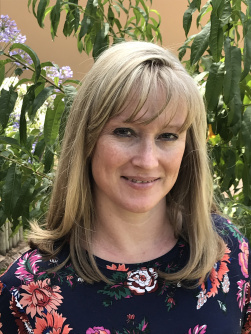
Robbie Cheadle has published nine books for children and one poetry book. She has branched into writing for adults and young adults and, in order to clearly separate her children’s books from her adult books, is writing for older readers under the name Roberta Eaton Cheadle.
Robbie Cheadle’s Sir Chocolate children’s picture books are written in sweet, short rhymes which are easy for young children to follow and are illustrated with pictures of delicious cakes and cake decorations. Each book also includes simple recipes or biscuit art directions which children can make under adult supervision. Her books for older children also incorporate recipes that are relevant to the storylines.
Roberta Eaton Cheadle’s supernatural stories combine fabulous paranormal elements with fascinating historical facts.
Children’s picture books – available as a square book and an A5 book (co-authored with Michael Cheadle):
Sir Chocolate and the strawberry cream story and cookbook
Sir Chocolate and the baby cookie monster story and cookbook
Sir Chocolate and the sugar dough bees story and cookbook
Sir Chocolate and the Condensed Milk River story and cookbook
Sir Chocolate and the Sugar Crystal Caves story and cookbook
Sir Chocolate and the Fondant Five story and cookbook
Sir Chocolate and the Ice Cream Rainbow Fairies story and cookbook
Middle school books:
Silly Willy Goes to Cape Town (includes five fun party cake ideas)
While the Bombs Fell (co-authored with Elsie Hancy Eaton)
Poetry book:
Open a new door (co-authored with Kim Blades)
Supernatural fantasy YA novel:
Through the Nethergate
Horror Anthologies (edited by Dan Alatorre):
Spellbound
Nightmareland
Dark Visions
Paranormal Anthologies (edited by Kaye Lynne Booth):
Spirits of the West
Whispers of the Past
Murder mystery Anthology (edited by Stephen Bentley)
Death Among Us
Blog: https://bakeandwrite.co.za/
Blog: robbiesinspiration.wordpress.com
Twitter: BakeandWrite
Instagram: Robbie Cheadle – Instagram
Facebook: Sir Chocolate Books
Want to be sure not to miss any of Robbie’s “Treasuring Poetry” segments? Subscribe to Writing to be Read for e-mail notifications whenever new content is posted or follow WtbR on WordPress.
#Blogtour Day 5 – My review of Feral Tenderness by Arthur Rosch
Join us over at the Roberta Writes blog for Day #5 of the Feral Tenderness Book Blog Tour, where Robbie Cheadle offers a review of this collection of poetry and photograhs by Arthur Rosch.
 What Amazon says
What Amazon saysA lifetime of poetry and photography gives a unique view of life, nature, the world, and the universe.
My reviewFeral Tenderness is an extraordinary collection of poems that strike right to the heart of human conditioning, frailty, and behaviours. Through reading these poems you will be removing the rosy coloured spectacles through which you have watched life until now, and will be exposed to the raw reality of human existence, both with its fatal flaws and also in its bountifulness and excesses.
The poet uses words to spear his reader and force contemplation of certain realities. There are unforgettable and powerful lines that will lurk in your subconscious to be drawn out and examined when you are confronted with certain emotions and situations. Some of my favourite of these lines are as follows:
“The glue that holds shut
the eyelids of your sightless soul
can be dissolved”
View original post 351 more words
February 18, 2021
Loving Art
We’re a little tardy in getting the Day #2 stop out to you. We lost it temporarily. So for Day #2 of the “Feral Tenderness” Book Blog Tour, you’ll find us over at Pictures from the Kitchen Window, with Barbara Spencer as she brings us an interview with author and poet, Arthur Rosch. Please drop by and join in the fun.
 Pictures From The Kitchen Window
Pictures From The Kitchen Window
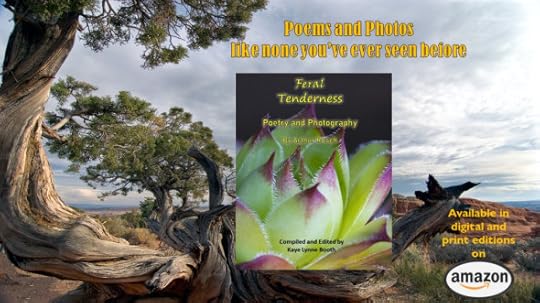
Arthur Rosch – poet extraordinaire.
I haven’t met Arthur Rosch. He is from California and me, from a tiny corner of the UK. Never mind about that – just look at the image above! Wow! If that doesn’t get you reading what will? It certainly did me and when I remember the fun I had hosting guests on my site – although they were all authors – I thought it was time I undertook a new journey and one likely to prove equally an inspiration.
A journey with poetry.
Philistine is the word I would use to describe my knowledge of poetry but other words come to mind too – total envy plus a heartfelt wish that I could manipulate words in such a way that a line of maybe five words has the same relevance as an entire page in a book.
And so my own journey begins with…
View original post 1,310 more words
Feral Tenderness – Just My Opinion
 Feral Tenderness Book Blog Tour
Feral Tenderness Book Blog TourFeral Tenderness, by Arthur Rosch, is a poetry and photography collection like no other I’ve ever encountered. I can say this with confidence, because I am the editor and compiler for this book, however it exempts me from posting my opinions of this collection on Amazon. But Writing to be Read is my blog, so I’d like to tell you about this interesting and unique collection of creativity here, taking into account that the author is a friend of mine, so the opinions expressed are likely to be biased. Be that as it may, I’m proud to associate myself with this work of creativity, a collection of poetry and photography worth more than just a casual glance. Arthur’s works need to be savored, like a fine wine, simmered over, like a sweet glaze, and appreciated for their unique and delectable flavors.
As I’ve mentioned on several occassions, Arthur Rosch sees the world in a unique way. Through his creative endeavors, those who care to look are allowed a glimpse of things through his eyes. His photography is amazing. The images that he captures with his lense say so much in a single moment. His poetry, on the other hand, is often a lengthy, social commentary on higher powers, human behavior, or the world at large. Yet, even his short poems seem to have a lot to say.
To illustrate my meaning, the following poem is minimal, yet it speaks volumes. It is my favorite of Arthur’s short snippits of poetry and the only one for which a true companion photo was also available from his photo library for inclusion in the collection.
Dewdrops
Dewdrops on spiderwebs:
sit lightly with life
 Little Web
Little WebAnother of Arthur’s profound poems, “Stars“, declares, in part, (I did mention that some of his poems are rather lengthy, too much so to be reprinted here in full),
” …Stars know what they are.
Stars are alive and individual,
quirky with personality,
often pulsing and drawing
gravity blood, gas and heat,
combining with other stars
combining and mating with other
stars and forming unions of
higher imaginations
in order to serve the Master of Stars… “
Another poem is an expression of nature, as seen through Arthur’s eyes. This one is one of my personal favorites.
Hunted By The Hawk
Make joy from stones.
Make wit from mud,
make humor from blood.
The tiny finch flies crazily,
for the sheer fun of it,
though it knows, each morning,
that it’s hunted by the hawk.
We too, each morning,
are hunted by the hawk.
The cover image for Feral Tenderness also came from Arthur’s photo library. With this photo, I was able to create an awesome cover design, if I do say so myself. We created cover images using several of Arthur’s photos, but in the end, this one grabbed both author’s and publisher’s hearts.
 Feral Tenderness Cover
Feral Tenderness CoverThe poetry and photos featured in this collection are so varied in subject matter and tone, that several book promotions with very different appeals seemed applicable to me. I used one of Arthur’s photographs for the background of one of them. Can you guess which one? Let me know in the comments which you like better.



Like this post? Let me know in the comments. You can be sure not to miss any of Writing to be Read’s great content by subscribe to e-mail or following on WordPress. If you found this content helpful or entertaining, please share.
February 17, 2021
#Booktour – Feral Tenderness, a book of poetry by Arthur Rosch
On Day Three of the “Feral Tenderness” Book Blog Tour and we’re over at Robbie’s Inspiration with a post from the author, Arthur Rosch about the realization of a dream. Join us.
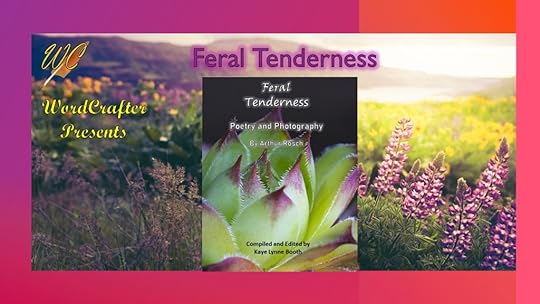
A lifetime of poetry and photography gives a unique view of life, nature, the world, and the universe
Today, I am delighted to welcome poet and author, Arthur Rosch, to Robbie’s Inspiration with his new poetry book, Feral Tenderness.
Fulfillment of a dreamThis book, Feral Tenderness, is the fulfillment of a dream. This volume has both poems and photographs. It unites two of my four creative media into a single opus. You may ask, (please) “What are your other two media”? I dabble, (I say modestly) in music and dance.
One night in 2002, I was performing at a venue near my home. I was reading poetry and playing drums. The drums were to accompany another poet who enjoyed my mallet work, the throb of tribal call and response. Two of my thick black notebooks of poetry lay at the lip of the stage. When I finished…
View original post 803 more words
Writing to be Read
- Kaye Lynne Booth's profile
- 37 followers






